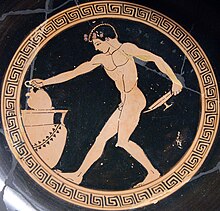

The oldest evidence of ancient wine production has been found in Georgia and Syria from c. 6000 BC (the earliest known traces of grape wine),[1][2][3][4][5][6][7][8][9] Iran from c. 5000 BC,[10] Greece from c. 4500 BC,[11][12] Armenia from c. 4100 BC (large-scale production),[13][14][15][16][17][18] and Sicily from c. 4000 BC.[19] The earliest evidence of fermented alcoholic beverage of rice, honey and fruit, sometimes compared to wine, is claimed in China (c. 7000 BC).[20][21][22]
The altered consciousness produced by wine has been considered religious since its origin. The ancient Greeks worshiped Dionysus or Bacchus and the Ancient Romans carried on his cult.[23][24] Consumption of ritual wine, probably a certain type of sweet wine originally, was part of Jewish practice since Biblical times and, as part of the eucharist commemorating Jesus's Last Supper, became even more essential to the Christian Church.[25] Although Islam nominally forbade the production or consumption of wine, during its Golden Age, alchemists such as Geber pioneered wine's distillation for medicinal and industrial purposes such as the production of perfume.[26]
Wine production and consumption increased, burgeoning from the 15th century onwards as part of European expansion. Despite the devastating 1887 phylloxera louse infestation, modern science and technology adapted and industrial wine production and widespread consumption now occur throughout the world.
- ^ "'World's oldest wine' found in 8,000-year-old jars in Georgia". BBC News. 13 November 2017. Retrieved 19 June 2020.
- ^ Keys, David (28 December 2003). "Now that's what you call a real vintage: professor unearths 8,000-year-old wine". The Independent. Retrieved 20 March 2011.
- ^ Georgia's Giant Clay Pots Hold An 8,000-Year-Old Secret To Great Wine, NPR.
- ^ Spilling, Michael; Wong, Winnie (2008). Cultures of The World Georgia. Marshall Cavendish. p. 128. ISBN 978-0-7614-3033-9.
- ^ "Wine Analysis". www.shimadzu.it (in Italian). Retrieved 31 May 2024.
- ^ Braatz, Dieter; Sautter, Ulrich; Swoboda, Ingo; Robinson, Jancis (4 August 2014). Wine Atlas of Germany. Univ of California Press. ISBN 978-0-520-26067-2.
- ^ Kuntz, Erwin; Kuntz, Hans-Dieter (20 January 2006). Hepatology, Principles and Practice: History, Morphology, Biochemistry, Diagnostics, Clinic, Therapy. Springer Science & Business Media. ISBN 978-3-540-28977-7.
- ^ "Wine Analysis". www.shimadzu.it (in Italian). Retrieved 22 July 2024.
- ^ Braatz, Dieter; Sautter, Ulrich; Swoboda, Ingo; Robinson, Jancis (4 August 2014). Wine Atlas of Germany. Univ of California Press. ISBN 978-0-520-26067-2.
- ^ Ellsworth, Amy (18 July 2012). "7,000 Year-old Wine Jar". University of Pennsylvania Museum of Archaeology and Anthropology.
- ^ Pagnoux, Clémence; Bouby, Laurent; Valamoti, Soultana Maria; Bonhomme, Vincent; Ivorra, Sarah; Gkatzogia, Eugenia; Karathanou, Angeliki; Kotsachristou, Dimitra; Kroll, Helmut; Terral, Jean-Frédéric (January 2021). "Local domestication or diffusion? Insights into viticulture in Greece from Neolithic to Archaic times, using geometric morphometric analyses of archaeological grape seeds". Journal of Archaeological Science. 125: 105263. Bibcode:2021JArSc.125j5263P. doi:10.1016/j.jas.2020.105263.
- ^ Valamoti, Soultana Maria (January 2015). "Harvesting the 'wild'? Exploring the context of fruit and nut exploitation at Neolithic Dikili Tash, with special reference to wine". Vegetation History and Archaeobotany. 24 (1): 35–46. Bibcode:2015VegHA..24...35V. doi:10.1007/s00334-014-0487-6.
- ^ "6000-year-old winery found in Armenia – Ya Libnan". 11 January 2011.
- ^ "EIGHT OF THE WORLD'S OLDEST WINERIES".
- ^ Holding, Deirdre (September 2014). Armenia: with Nagorno Karabagh. The Globe Pequot Press Inc. p. 284. ISBN 9781841625553.
- ^ Johnson, Hugh (September 2014). Hugh Johnson's Pocket Wine Book 2019. Octopus Publishing Group. ISBN 9781784724825.
- ^ "Decanter". Decanter magazine. Vol. 36, Nummers 5-8. February 2011.
- ^ "Wine 4,100 B.C. – World's Oldest Winery Discovered". 27 August 2014.
- ^ Tondo, Lorenzo (30 August 2017). "Traces of 6,000-year-old wine discovered in Sicilian cave". The Guardian.
- ^ Li, Hua; Wang, Hua; Li, Huanmei; Goodman, Steve; Van Der Lee, Paul; Xu, Zhimin; Fortunato, Alessio; Yang, Ping (2018). "The worlds of wine: Old, new and ancient". Wine Economics and Policy. 7 (2): 178–182. doi:10.1016/j.wep.2018.10.002. hdl:10419/194558.
- ^ Cañete, Eduardo; Chen, Jaime; Martín, Cristian; Rubio, Bartolomé (2018). "Smart Winery: A Real-Time Monitoring System for Structural Health and Ullage in Fino Style Wine Casks" (PDF). Sensors. 18 (3): 803. Bibcode:2018Senso..18..803C. doi:10.3390/s18030803. PMC 5876521. PMID 29518928.
- ^ Hames, Gina (2010). Alcohol in World History. Routledge. p. 17. ISBN 9781317548706.
- ^ The history of wine in ancient Greece Archived 12 July 2002 at the Wayback Machine at greekwinemakers.com
- ^ "UNESCO Pafos Archaeological Park".
- ^ DODD, EMLYN K. (2020). ROMAN AND LATE ANTIQUE WINE PRODUCTION IN THE EASTERN MEDITERRANEAN : a comparative ... archaeological study at antiochia ad cragum. [Place of publication not identified]: ARCHAEOPRESS. ISBN 978-1-78969-403-1. OCLC 1139263254.
- ^ Ahmad Y Hassan, Alcohol and the Distillation of Wine in Arabic Sources Archived 3 July 2007 at the Wayback Machine